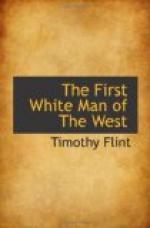Harmar, in his official account of this affair, claimed the victory, although the Americans seem clearly to have had the worst of it. At his request, he was tried by a court martial, and honorably acquitted. The enemy had suffered so severely, that they allowed him to return unmolested to Fort Washington.
The terrors and the annoyance of Indian hostilities still hung over the western settlements. The call was loud and general from the frontiers, for ample and efficient protection. Congress placed the means in the hands of the executive. Major General Arthur St. Clair was appointed commander-in-chief of the forces to be employed in the meditated expedition. The objects of it were, to destroy the Indian settlements between the Miamies; to expel them from the country; and establish a chain of posts which should prevent their return during the war. This army was late in assembling in the vicinity of Fort Washington. They marched directly towards the chief establishments of the enemy, building and garrisoning in their way the two intermediate forts, Hamilton and Jefferson. After the detachments had been made for these garrisons, the effective force that remained amounted to something less than two thousand men. To open a road for their march, was a slow and tedious business. Small parties of Indians were often seen hovering about their march; and some unimportant skirmishes took place. As the army approached the enemy’s country, sixty of the militia deserted in a body. To prevent the influence of such an example, Major Hamtranck was detached with a regiment in pursuit of the deserters. The army now consisting of one thousand four hundred men continued its march. On the third of November 1792, it encamped fifteen miles south of the Miami villages. Having been rejoined by Major Hamtranck, General St. Clair proposed to march immediately against them.
Half an hour before sunrise, the militia was attacked by the savages, and fled in the utmost confusion. They burst through the formed line of the regulars into the camp. Great efforts were made by the officers to restore order; but not with the desired success. The Indians pressed upon the heels of the flying militia, and engaged General Butler with great intrepidity. The action became warm and general; and the fire of the assailants passing round both flanks of the first line, in a few minutes was poured with equal fury upon the rear. The artillerists in the centre were mowed down, and the fire was the more galling, as it was directed by an invisible enemy, crouching on the ground, or concealed behind trees. In this manner they advanced towards the very mouths of the cannon; and fought with the infuriated fierceness with which success always animates savages. Some of the soldiers exhibited military fearlessness, and fought with great bravery. Others were timid and disposed to fly. With a self-devotion which the occasion required, the officers generally exposed themselves to the hottest of the contest, and fell in great numbers, in desperate efforts to restore the battle.




